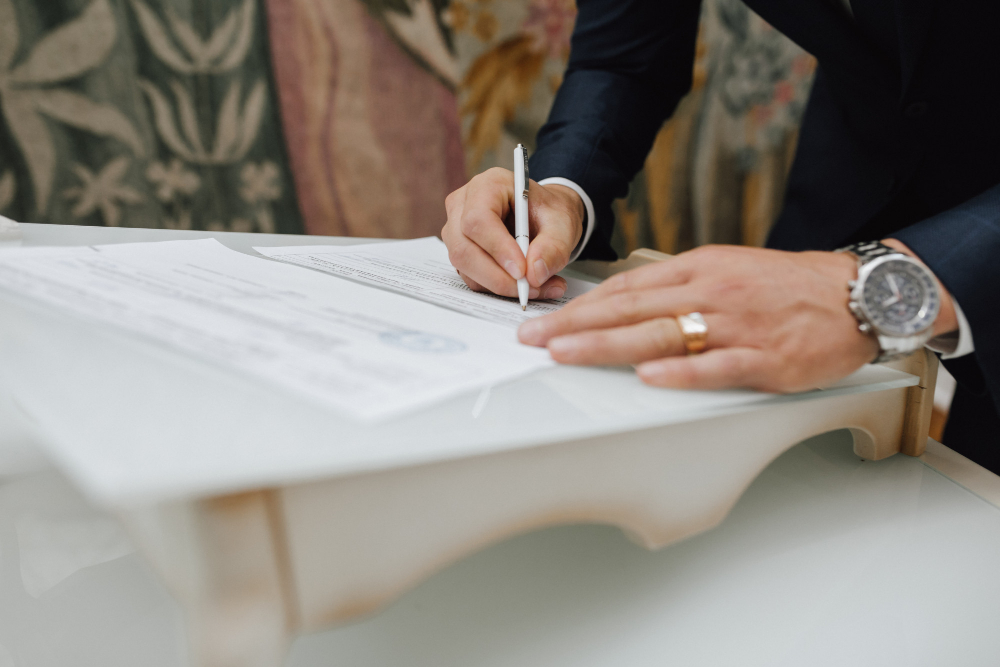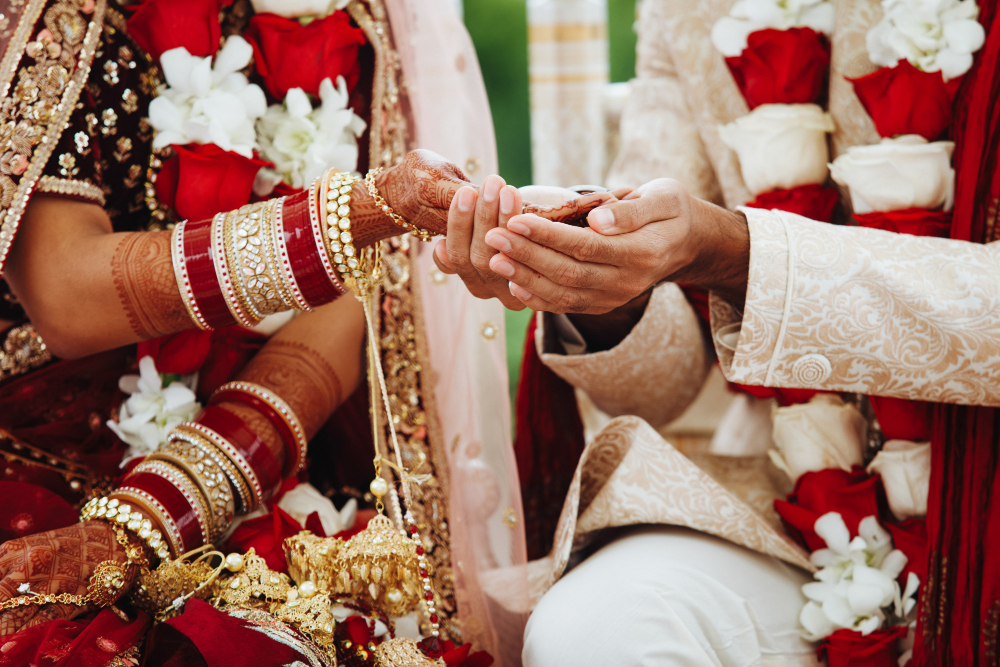How to Get a Marriage Certificate
Posted on 15 March
Amidst the whirlwind of activity in your wedding, you may not get a moment or two to check the procedures to apply for a marriage certificate. It is a legal proof of marriage between two people. Having your marriage registered and procuring a marriage certificate is required for a husband and wife to avail many facilities or services in India.
It is a certificate which offers evidence of marriage and social security, especially among women. The supreme court has made it mandatory to register the wedding for the purpose of women protection in the year 2006.
Here's a rundown to the two different acts under which you can get your marriage registered, the advantages of a marriage certificate, the documents and procedure to be followed to get a marriage certificate.
Advantages of a Marriage Certificate
- The certificate is advantageous to claim the bank deposits, family pension, life insurance(if the insurer or depositor passes away without a nominee or otherwise.)
- This certificate is necessary when you have to prove that you're married to a person legally for procedures such as getting a passport, visa, or changing your last name after marriage.
- It is also beneficial for a husband who lives and works in a foreign country on a residence visa or a work permit and wants his spouse to join him or the other way round. For divorce, alimony, child custody, the court may want to take a look at the marriage certificate.
It is also beneficial for a husband who lives and works in a foreign country on a residence visa or a work permit and wants his spouse to join him or the other way round. For divorce, alimony, child custody, the court may want to take a look at the marriage certificate.
Marriage Acts in India Under Which a Marriage can be Registered
The different marriage acts in India are:
- The Hindu Marriage Act: In India, a marriage can be registered and solemnized under this Act provided that the couple is Hindu, Buddhist, Jain or Sikh or is converted to any of these religions.
- The Special Marriage Act: In India, a marriage can be registered and solemnized under this Act, regardless of the religion of the husband and wife. The special marriage act is applicable to Indian nationals who live in a foreign country and for an inter-religion wedding.
Eligibility Criteria
- For males, the eligible age is 21 and for females, 18 to get married.
- Marriage solemnized under the Hindu or special marriage act is eligible to be registered.
- A marriage already solemnized can be registered under either of the laws.
- When registered following two months of the wedding date, the fees may differ.
- You can't apply if you aren't above 21(male)/18(female) as it will be regarded as an offence.
Required Documents

- Application form with signatures of the husband and wife.
- Two passport size photos of husband and wife, one wedding photo.
- Age proof of husband and wife.
- Separate marriage affidavits from the husband and wife, mentioning nationality, date and place of wedding, marital status at the time of wedding(in the provided format).
- Aadhaar card of husband and wife.
- Address proof of either party whose area sub district magistrate is approached for the marriage certificate.
- Wedding invitation(if available)
- A certificate from the priest who solemnified the wedding(if the wedding took place in a religious place.
- A conversion certificate from the priest who solemnised the wedding(applicable for Hindu marriage act)
- Divorce decree/order(divorcee), death certificate of husband/wife(widow/widower)
- The fee in the case of the Hindu marriage act varies from one place to another. A deposit of Rs 100 for the Hindu marriage act and Rs 150 for the Special marriage act should be paid to the cashier of the district(the civic body charges Rs 150 at present in case of special marriage act). The application form, along with the cash receipt, must be attached together during submission.
It is to be noted that the documents attached need to be self-attested. Individuals can apply online and offline(by visiting the registrar's office).
Offline Procedure
Marriages under Hindu and special marriage acts need to be registered at the corresponding Corporation, municipality or panchayat in which the marriage was conducted. The application needs to be submitted within a span of 45 days of the date of solemnisation of the wedding. You can avail the form number 1(prescribed application form) free of cost from the registrar's office.
For Hindu Marriage Act
- Visit the office of sub divisional magistrate on a working day. It is mandatory to have the husband and wife to be present there.
- The application form needs to be collected and completely filled. Both the parties and two witnesses have to sign on it.
- The form needs to be accompanied by the aforementioned documents.
- Upon verification of these documents, you are provided with an appointed date with the Sub-district magistrate.
- On that date, the husband and wife need to appear personally before the registrar, accompanied by a gazetted officer who was present at the wedding and has to sign the marriage registrar.
- The sub-district magistrate will verify your application and sign the legal document.
- The marriage certificate is issued on the appointed date itself.
For the Special Marriage Act
- Parties belonging to any religion are eligible to apply for marriage registration in case of a special marriage act.
- Once the documents and application form are submitted, any objections can be addressed(by the individuals related to the parties) within 30 days.
- One of the copies of the notice is sent to the addresses as provided by the husband and wife. The other copy is secured on the notice period of the office.
- After 30 days of notice, the Registration begins with the sub district magistrate. During the time of Registration, the husband, wife and three witnesses need to be present.
- The sub district magistrate then issues a public notice, inviting objections.
For Online Registration

The best thing about this facility is that the married couple can register and receive the marriage certificate from anywhere.
- Search online marriage registration with the name of your location as the state or district varies.
- Visit the government website
- Choose your district and click continue
- Enter details of the spouse and select- Registration of marriage certificate.
- Enter details in the marriage certificate form and select an appointment date.
- Choose submit application
- You will be provided with a temporary number, which is also mentioned in the acknowledgement slip.
- You need to save the acknowledgement slip on the desktop to know its status.
- Take a printout of the marriage certificate form and acknowledgement slip.
- Show up at the office with the witnesses, for an interview and bring along all the documents such as wedding invitation, photos on the appointed date.
- Receive the marriage certificate from the sub-divisional magistrate.
For delayed application, the registration officials will send your application plus form 2 and other compulsory documents to the concerned registrar general to condone the delay.
The e-furnishing of details won't be regarded as the rightful filling of the memorandum, as per the rule. According to the existing rule, the married couple needs to be present before the registrar to sign for the Registration of marriage.
Appointment
You can expect an appointment within 15 days of Registration (for the Hindu marriage act) and up to 60 days(for special marriage act).
Witness
Any person who was present at the time of marriage of the parties can be a witness and need to have documents like proof of residence and PAN card/aadhar card to authenticate their identity. It is required to get the signature of the witnesses for marriage registration. But the witnesses need to be above 21 years old.
Validity
There is no inbuilt expiry period for the marriage certificate.
Processing Time
The whole process will take about 20 to 45 days from the application date.
Application fees
- The fee of application is Rs 5/- and the certified copy fee is Rs 10/- in the case of the Hindu marriage act.
- The fee for marriage solemnisation is Rs 5. Rs 15 extra for marriage solemnisation at a location outside the office in case of Special marriage act.
- Rs 3 for notice of intended marriage and Rs 2 for marriage certificate's certified copy.
Important Documents
To download forms, visit this website.
Tatkal Marriage Certificate

Sometimes, the parties need a marriage certificate at the spur of a moment for a legal claim or visa requirement. Married individuals often face delays in reaching abroad because of not having a marriage certificate.
The revenue department of the Delhi government has initiated a tatkal service that became operational in the year 2014 to issue the marriage certificate in an emergency. This service ensured a single-day authorisation of wedding, in which the marriage registration process will be prioritised.
The tatkal service lets married couples register for their wedding and receive the marriage certificate issued within a span of 24 hours after paying a fee of Rs 10000.
Since the foreign embassies in India and foreign countries don't recognise traditional weddings, the marriage certificate is compulsory for the parties to move abroad with a spouse visa.
You need to report in cases when the marriage certificate data isn't available online and then apply in person. You can report this to your corporation/municipality/panchayat.






